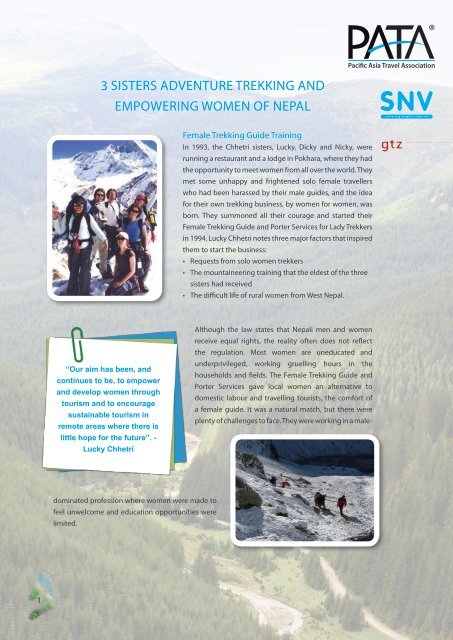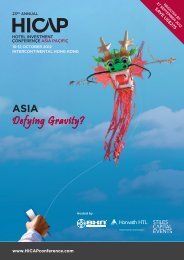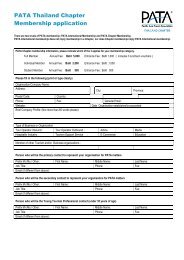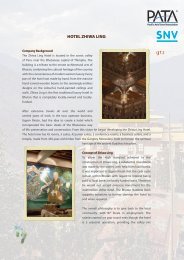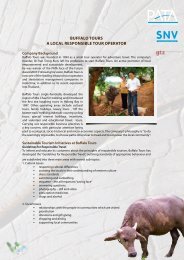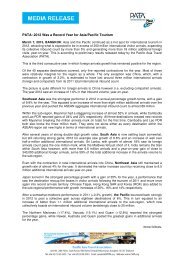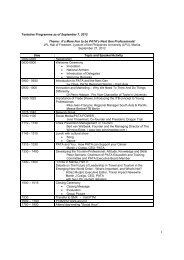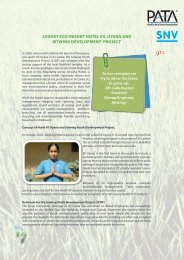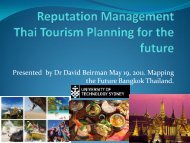3 sisters adventure trekking and empowering women of nepal
3 sisters adventure trekking and empowering women of nepal
3 sisters adventure trekking and empowering women of nepal
- No tags were found...
Create successful ePaper yourself
Turn your PDF publications into a flip-book with our unique Google optimized e-Paper software.
3 SISTERS ADVENTURE TREKKING ANDEMPOWERING WOMEN OF NEPALFemale Trekking Guide TrainingIn 1993, the Chhetri <strong>sisters</strong>, Lucky, Dicky <strong>and</strong> Nicky, wererunning a restaurant <strong>and</strong> a lodge in Pokhara, where they hadthe opportunity to meet <strong>women</strong> from all over the world. Theymet some unhappy <strong>and</strong> frightened solo female travellerswho had been harassed by their male guides, <strong>and</strong> the ideafor their own <strong>trekking</strong> business, by <strong>women</strong> for <strong>women</strong>, wasborn. They summoned all their courage <strong>and</strong> started theirFemale Trekking Guide <strong>and</strong> Porter Services for Lady Trekkersin 1994. Lucky Chhetri notes three major factors that inspiredthem to start the business:• Requests from solo <strong>women</strong> trekkers• The mountaineering training that the eldest <strong>of</strong> the three<strong>sisters</strong> had received• The difficult life <strong>of</strong> rural <strong>women</strong> from West Nepal.“Our aim has been, <strong>and</strong>continues to be, to empower<strong>and</strong> develop <strong>women</strong> throughtourism <strong>and</strong> to encouragesustainable tourism inremote areas where there islittle hope for the future”. -Lucky ChhetriAlthough the law states that Nepali men <strong>and</strong> <strong>women</strong>receive equal rights, the reality <strong>of</strong>ten does not reflectthe regulation. Most <strong>women</strong> are uneducated <strong>and</strong>underprivileged, working gruelling hours in thehouseholds <strong>and</strong> fields. The Female Trekking Guide <strong>and</strong>Porter Services gave local <strong>women</strong> an alternative todomestic labour <strong>and</strong> travelling tourists, the comfort <strong>of</strong>a female guide. It was a natural match, but there wereplenty <strong>of</strong> challenges to face. They were working in a maledominatedpr<strong>of</strong>ession where <strong>women</strong> were made t<strong>of</strong>eel unwelcome <strong>and</strong> education opportunities werelimited.1
To combat these challenges, the Chhetri <strong>sisters</strong>pushed hard for instruction at the Council forTechnical Education <strong>and</strong> Vocational TrainingInstitute. This was an eye-opening experience,because they were now able to design their ownintroductory training programme designed fordisadvantaged <strong>and</strong> rural mountain <strong>women</strong>. Thecourse was tailored to their level <strong>of</strong> underst<strong>and</strong>ing <strong>and</strong>aims, giving them confidence to join this pr<strong>of</strong>ession <strong>and</strong>an eagerness to learn <strong>and</strong> earn.The first training took place in 1996 with 10 participants.The <strong>trekking</strong> company 3 Sisters Adventure Trekking was<strong>of</strong>ficially registered in 1998. To continue the training A guide participant says:programme, they founded Empowering Women <strong>of</strong> “I learned to becomeNepal in 1999. Since then, 3 Sisters <strong>and</strong> EWN have an ambassador for mybeen working closely together to empower <strong>women</strong> incountry.”the <strong>trekking</strong> industry <strong>and</strong> to make them independent,confident <strong>and</strong> self-sufficient.Between 1999 <strong>and</strong> 2008 EWN conducted 18 basicfemale <strong>trekking</strong> guide training programmes with over600 participants. The <strong>women</strong> who entered the tourismbusiness through the programme came from all parts <strong>of</strong> the country; some <strong>of</strong> them low caste <strong>women</strong>whom society looked down upon, others socially disadvantaged <strong>and</strong> facing challenges in life.Trekking training <strong>of</strong>fers a unique combination<strong>of</strong> very practical life skills <strong>and</strong> a broaderglobal perspective, improving cognitiveskills <strong>and</strong> fostering independent thinking.There is a large dem<strong>and</strong> for female <strong>trekking</strong>staff in the market, but a limited supply<strong>of</strong> skilled <strong>women</strong>. EWN <strong>and</strong> 3 SistersAdventure Trekking have filled this voidin the male-dominated <strong>trekking</strong> industry.2
Implementation ProcessA six-month <strong>trekking</strong> guide apprenticeshiptakes place twice a year in Pokhara, at thebase <strong>of</strong> the Himalayas. Women from remoterural areas are provided with <strong>trekking</strong>equipment, free accommodation <strong>and</strong> foodat the EWN hostel. The maximum group sizeis 40, <strong>and</strong> the average age <strong>of</strong> participants isabout 20, drawing participants from differentregions in Nepal.The programme begins with an intensivefour-week training course that teaches the<strong>women</strong> technical <strong>and</strong> conversational English as well as the essential skills <strong>and</strong> knowledge to work as<strong>trekking</strong> guides. The training also emphasises ecological awareness <strong>and</strong> conservation, covering watersanitation, crop rotation, waste management <strong>and</strong> alternative sources <strong>of</strong> fuel.As participants develop into <strong>adventure</strong> tourism pr<strong>of</strong>essionals, they pass on the sound ecologicallypractices they learned at the training programme to their clients <strong>and</strong> the villages along theirroutes. For example, they promote the use <strong>of</strong> iodine purification methods rather than relyingon purchased mineral water <strong>and</strong> littering the Himalayas with its attendant plastic bottles. Theyeven knit practical water bottle holders to raise money for the project. In the tea houses alongtheir trails, the guides give lessons on safe cooking techniques <strong>and</strong> waste management practicesto help improve the local economy <strong>and</strong> create a sustainable <strong>trekking</strong> industry. The initial trainingalso teaches knowledge about Nepali culture <strong>and</strong> history, which is insightful for many participants.The subjects <strong>of</strong> the initial training comprise• Technical <strong>and</strong> conversational English• First Aid (HIV/AIDS, Sexual Transmitted Diseases - STD, <strong>women</strong>‘s health issues leadership)• Women’s rights/human rights• Trekking information /tourism• Environment• History / Geography /Map reading• Culture /Religion• Flora <strong>and</strong> FaunaIn just one month, <strong>women</strong> who had nomeans <strong>of</strong> earning a living by themselvesare set on the path to self-sufficiency. Atthe end <strong>of</strong> the training, the <strong>women</strong> enter anapprenticeship programme with 3 SistersAdventure Trekking where they earn wagesequal to those <strong>of</strong> men <strong>and</strong> acquire fieldexperience working as trainee guides. From3
their apprenticeship they gain immediate economic benefits <strong>and</strong> develop the skills they need toemerge as independent entrepreneurs. Each woman learns at her own pace, possibly going throughthe 6-month programme only once, possibly several times, until she has refined the necessary skillsenough to become a fully qualified <strong>trekking</strong> guide. The action-based apprentice training approachallows <strong>women</strong> to advance up the <strong>trekking</strong> guide career ladder as they gain experience.BenefitsSince 1998 the three <strong>sisters</strong> have managed to bridge a gap in the market <strong>and</strong> contribute successfullyto <strong>women</strong> empowerment. Their story has been the topic <strong>of</strong> many (inter)national publications,documentaries films <strong>and</strong> other media coverage.Thanks to this exposure, more <strong>and</strong> more<strong>women</strong> are finding their way into the <strong>trekking</strong>apprenticeship. The project has receivedglobal recognition <strong>and</strong> awards from differentorganisations, such as Travel Plus Leisure <strong>and</strong>National Geographic.A programme participant says:“I feel like I have been releasedfrom a prison. For the first timein my life. I have the freedom toThrough the three <strong>sisters</strong>’ work <strong>and</strong> activities,it is now acceptable for <strong>women</strong> to work in theNepali tourism industry. 3 Sisters AdventureTrekking <strong>of</strong>fers its employees not only fairwages (they earn US$1,200 annually, whilst thelive as I choose.” The programmehelps the <strong>women</strong> to becomeself-sufficient <strong>and</strong> independentas well as developing theirconfidenceNepali average is US$ 240) but also benefitssuch as insurance, tuition fees for their children<strong>and</strong> a savings <strong>and</strong> credit programme. Theimprovement <strong>of</strong> the <strong>women</strong>’s social <strong>and</strong> economic situation also directly influences their families <strong>and</strong>communities. Through the contact with travellers from all over the world a vital cultural exchangetakes place which benefits both sides.Their wages allow them to pay for university,family, medical expenses, siblings’ education<strong>and</strong> their own businesses, resulting inboosted self-confidence, independence <strong>and</strong>pr<strong>of</strong>essional skills. The three <strong>sisters</strong> havecreated a platform for <strong>women</strong> to experiencetheir capacities <strong>and</strong> interests, which enablesthem to make their own choices about theirfuture. The programme gives the <strong>women</strong> achance to exp<strong>and</strong> social boundaries <strong>and</strong>, in thelong run, to contribute to social change <strong>and</strong> abetter quality <strong>of</strong> life for all Nepali <strong>women</strong>.4
Investment in the projectThe total cost <strong>of</strong> running the female <strong>trekking</strong>guide training amounts to US$5,500-6,500,depending on the number <strong>of</strong> participants.In 2001, the three <strong>sisters</strong> began gatheringsupport to sustain the programme from variousnational <strong>and</strong> international organisations, inaddition to donations received from friends<strong>and</strong> clients. Their <strong>trekking</strong> business is makinga reasonable pr<strong>of</strong>it, which keeps the trainingin motion even when donations are sparse.OutlookPlans include construction <strong>of</strong> a training centre for <strong>adventure</strong> tourism in Pokhara to increase the number<strong>of</strong> female <strong>trekking</strong> guide training programmes. With the proper training institute facilities they plan toturn out more pr<strong>of</strong>essional <strong>and</strong> specialised guides in different areas, such as language, culture, flora, birdwatching <strong>and</strong> many more. There is also a plan to train climbing staff <strong>and</strong> rock <strong>and</strong> ice climbing instructors.Contact AddressEmpowering Women <strong>of</strong> Nepal <strong>and</strong> 3 Sisters Adventure TrekkingMrs. Lucky Chhetri Founder <strong>of</strong> Empowering Women <strong>of</strong> Nepal, Executive Director <strong>of</strong> 3 SistersAdventure TrekkingEmail:ewn@3<strong>sisters</strong><strong>adventure</strong>.comPhone: + 977 61 462231/462066Address: P.O. Box 284Lakeside, KhaharePokhara–6, NEPALSourceswww.3<strong>sisters</strong><strong>adventure</strong>.comwww.3<strong>sisters</strong><strong>adventure</strong>.com/EWN5


